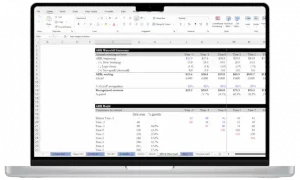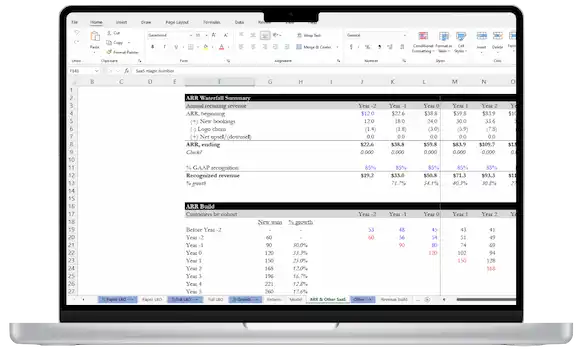The lucrative and fast-paced career of an investment banker is a highly competitive one.
For instance, in a recent year, 236,000 applicants competed for roughly 3,500 internships at Goldman Sachs. This is common across the industry where acceptance rates for programs are typically less than 2%.
Despite its tough publicity over the years, investment banking is still a highly sought-after career in the finance sector. To break into this field, you must have a genuine passion for finance, a drive to succeed, and a high threshold for working hard. Whether you’re an undergraduate or looking to switch career paths, you’ll face tough competition to land a role in the industry.
Having worked as an investment banker myself and having coached hundreds of candidates through similar recruitment processes, I’m excited to lay out this roadmap for anyone embarking on this career path.
I’ll cover everything from what to expect during the recruitment process to the best ways in which you can stand out from the competition.
What do investment bankers do?
Investment bankers typically work with organizations and governments to perform corporate finance transactions like raising debt, equity, or M&A.
Clientele can range from young growing businesses to high-profile companies and government agencies.
Daily tasks vary depending on their project and role within the organization, but an investment banker’s responsibilities often include creating financial models, performing valuation analysis, creating presentations with strategic recommendations for clients, writing marketing materials for debt or equity issuances, or advising on mergers.
Here is a deeper breakdown of typical engagements that clients hire investment bankers to perform:
1. Arrange debt financing
When companies or governments need to raise money, investment bankers may plan and manage bonds (or bank loans) to raise the necessary capital.
If a private company opts for private placement bonds, for example, an investment banker plans the bond, prices it, and markets it to the investors the company wants to attract. Often, this will involve the investment bank underwriting the risk, which means the debt is owned by the bank before they are able to sell it off.
2. Manage IPOs
Public companies can initiate an IPO to raise money by selling shares, also known as equity financing, to potential stockholders. Investment bankers begin and manage that process by drafting a prospectus, implementing the sale of the stocks, and pricing them accordingly. This can also involve balance sheet risk for banks.
3. Negotiate and advise on mergers and acquisitions
Investment bankers act as financial advisors and negotiators during mergers and acquisitions. The process is usually long, involving a great deal of negotiating, paperwork, and financial planning. There’s lots of financial modeling as well.
For more, check out my primer on the investment banking job and what it entails.
Why investment banking?
A critical question to answer for yourself before you embark on this journey is whether investment banking aligns with your life goals.
This is also a critical question asked in all interviews.
A career in investment banking can provide high job satisfaction, particularly if you love learning and working on high profile deals. Additionally, there’s excellent career progression in varying fields, a handsome salary, and financial security.
There are several personal motivations to work in the finance sector. Here are some top reasons why investment banking might be worth it for you:
1. You want lots of responsibility and learning opportunities
In investment banking, you’re going to work a ton. With the demanding nature of it, you can expect huge growth opportunities from day one.
(I used to joke that investment banking gave me more than a couple of my gray hairs. If you look at my photo, I have quite a few now.)
The joke had a lot of truth though. Investment banking provides the opportunity for you to work on deals that can be worth billions of dollars from a very young age. You will likely be handling important tasks and transactions from early on.
While stressful, the flip side is this steep learning curve will help you absorb super valuable skills.
2. You want ambitious and interesting coworkers
The investment banking career path attracts highly qualified, highly driven people. If you become an investment banker, you’ll get to work alongside like-minded individuals and be inspired to push yourself.
Another attractive aspect is that you will likely be working alongside a group of other young professionals starting in the industry at the same time. In such an intensive environment, you will quickly come to create deep bonds for life while having fun along the way.
3. You’re looking to the future
Investment banking opens doors to different career paths. Often, investment bankers use their role as a stepping stone into private equity, hedge funds, venture capital, or growth equity. If you’re interested in one day getting into a growth equity career, investment banking is the logical precursor.
4. You want to earn a great income
You’ll want to leave this last reason out if your interviewer asks you why you’re pursuing a career in investment banking. Still, there’s no denying that investment banking offers a powerful financial incentive.
For more, check out my dedicated article on answering the why investment banking question in interviews.
Is it hard to get a job in investment banking?
Yes! Investment banking is one of the most competitive industries to get a job in.
While every situation is different, and clearly there can be outliers, there are a couple common paths into investment banking.
I go though each of them below.
How to become an investment banker
Typically, there are a couple of common career entry points into the industry. I profile them below:
As an undergraduate
The traditional path to becoming an investment banker is through undergraduate recruiting. There are two ways to enter investment banking as an undergrad.
- Summer analyst internship (sophomore year recruiting) — Most banks fill their full-time class of analysts by giving offers to folks who successfully completed an internship during their junior year. In the US, investment banks recruit for junior-year internship positions during the sophomore year of a candidate’s undergrad experience. Typically, the full-time offer rate is quite high for interns (70%+).
- Via a full-time analyst offer (senior year recruiting) — For those few spots not filled by interns, investment banks return to campuses to recruit for full-time roles. This typically occurs during the senior year of a candidate’s undergrad experience.
The best ways to stand out for these positions:
- Strong undergrad school
- Strong grades (3.7 GPA or higher)
- Network with bankers ahead of time to prove your interest
- Strong freshman year internship in finance
- Passion for finance (e.g. involved in an investment club)
- Strong leadership or extracurriculars (e.g. captain of a team, president of the student body)
- Ability to learn quickly (e.g. self-taught accounting)
- Demonstrate commitment to career in finance by preparing for the CFA (and ideally passing at least level 1)
Because the recruitment process for internships begins as early as your sophomore year of college, you’ll need to commit early on to be competitive. As an undergrad, you should start building networking connections and study valuable industry skills on your own or through coursework — such as valuation and accounting — to prepare for an internship.
Even if you land an internship with a company that you don’t see yourself with long-term, it’s critical to get an offer for a full-time role because you will be asked whether you got an offer by other firms when you recruit again.
After undergrad, but before MBA
If you didn’t get a role in investment banking from your undergrad days, all isn’t lost.
It will be harder to get into the investment banking field, especially at a top bulge-bracket investment bank, but it’s not impossible. If you begin working as a postgrad in a field within finance, such as consulting or perhaps even accounting, you may be able to shift into investment banking.
This is NOT a common route to investment banking, but it’s possible — especially if market conditions are good. Employees in similar roles can sometimes make lateral jumps to firms as people unexpectedly leave.
How to stand out:
- Do serious networking to make inroads and show your passion for the role
- Come up with a narrative for why you didn’t do investment banking right out of undergrad (ideally the answer isn’t “I wasn’t selected,” but rather a positive answer)
- Target regional or smaller investment banks if you struggle to get traction
- Strong undergraduate experience is key; top school with great extracurriculars and GPA
- Offer to do an unpaid banking internship or trial to get experience
If you graduated more than three years ago, the story gets harder and an MBA may be your best way in.
As an MBA student
An MBA program is a great way for career switchers to enter the investment banking field. To get into one of the top MBAs, you typically need three to five years of work experience, though every candidate’s story is different.
The path into investment banking from an MBA program is similar in a way to undergraduate recruiting in that there are two routes in:
- Summer associate internship (first-year recruiting) — Banks will recruit for these roles in your first year, and most full-time roles are filled by people who got high marks during the summer internship
- Full-time associate hiring (second-year recruiting) — Most roles are filled through the summer associate internship program; however, banks return to campus full-time in the second year to fill out the class.
How to stand out:
- Get into a top MBA program
- Have a compelling story for “why investment banking?”
- Your prior experience doesn’t necessarily need to be finance related, but your experiences need to be compelling and you need to show the desire for finance
- Network really hard to show your hustle and passion for the job!
- During networking sessions, you’ll want to make strong connections with specific groups within a bank

- 24 lessons
- 6+ video hours
- Expert instructor
ONLINE COURSE
Assess Business Models Like An Investor
Designed for aspiring private equity, growth, or venture investors
Best schools for investment banking
Bulge bracket investment banks fill their analyst and associate classes from top-rated undergraduate and MBA programs.
Generally firms target Ivy League schools and top liberal arts schools. However, it may be somewhat surprising that lots of recruiting is determined by where senior bankers happened to go to school.
For instance, if a senior Managing Director happened to go to X school (and wanted to get involved in recruiting), he or she could single-handedly compel the bank to do recruiting there.
Each bank will have a “target” list of schools where it does most of its hiring from and where its bankers plan to visit and interview at each year. However, top banks are also open to great applicants from non-target schools as well, though the process may not be quite as streamlined for those candidates (e.g. they may need to travel to NYC HQ for interviews, rather than doing them on-campus, etc).
Go here to see the complete list of best schools for investment banking.
Undergrad schools
At the undergrad level, you don’t necessarily need to go to a strong business program (in fact, you don’t have to major in business). Rather, it’s more important that you go to the most competitive school you can and that you excel there with super high grades and impressive extracurriculars.
Here’s a non-exhaustive list of top undergrad schools for investment banking recruiting:
- All Ivy League schools (e.g. Harvard, Princeton, Yale, Columbia, etc.)
- Top liberal arts colleges (e.g. Amherst,
Williams, Bowdoin, etc.) - University of Chicago
- Johns Hopkins
- Duke
- Northwestern
- Vanderbilt
- Rice
- Notre Dame
- UC Berkeley
- Georgetown
MBA programs
At the MBA level, the only thing that matters is getting into a strong top 15 business school. Top investment banks hire from all of them.
Here’s a non-exhaustive list of top MBA programs for investment banking recruiting:
- All Ivy League MBA programs (e.g. Columbia, Cornell, HBS, Penn, Dartmouth, etc.)
- Georgetown University (McDonough)
- MIT (Sloan)
- Northwestern (Kellogg)
- University of Chicago (Booth)
- University of Virginia (Darden)
- University of Michigan (Ross)
- Duke (Fuqua)
- Stanford (GSB)
- NYU (Stern)
What degree do I need for investment banking?
For undergraduate hires, if you went to a top school, you don’t need to major in business. In fact, most Ivy League schools and other top schools don’t even offer a business degree for undergraduates.
Yes, it can be helpful for students to take classes in business, finance, accounting, or economics; however, typically investment bankers believe you’ll learn most of what you need to learn on the job. They are just looking to hire for horsepower to make sure you learn quickly and are adequately motivated.
For MBA hires, in a way, your undergraduate degree will be even less relevant, especially if you have relevant work experience before the MBA program. That said, you’ll want to ensure your coursework and/or major in the MBA program is focused on relevant areas like corporate finance.
Investment banking recruiting process
Investment banking recruiting is an extremely competitive process, so you’ll want to do whatever you can to stand out during the recruitment process.
Banks value the quality of your job experience, and the quality of your schools attended, and how hard you network or “hustle” for the role.
A standard recruitment process may look like this:
- You’ll start by networking to build relationships with alumni, bankers, potential clients, and decision-makers.
- To prepare for upcoming job interviews, you’ll study specialized interview guides and resources aimed at investment bankers.
- When the time comes, you’ll apply for an internship or full-time position
- If your application is accepted, you’ll undergo an initial interview phase, which usually includes a recorded HireVue interview (discussed below) and phone/Zoom interviews with human bankers or HR.
- If you pass your first interviews, you’ll be invited to a superday consisting of a handful of back-to-back interviews with different members of the firm.
- If the superday goes well, the final step is to review and accept the job offer.
Go here for a deeper breakdown of the investment banking recruiting process.
Investment banking resume
With so many applicants to investment banking, your resume has got to stand out.
Recruiters and firms face mountains of resumes, so they’re likely to quickly scan through to sort candidates. To avoid the rejection pile, cover your bases with these suggestions:
Education
Big banks and prestigious firms put a high importance on education and grades. Make sure you highlight and include any relevant education, including:
- Undergraduate degree: Most banks and firms look for candidates from Ivy League or other top schools (discussed above). They tend to prefer candidates with degrees in finance, economics, accounting, or business — though this is not necessarily required if you went to a great school.
- MBA: A Master of Business Administration can help candidates with employment experience transition into investment banking; see section above.
Under Education, you’ll want to list where you went to school, your major, any active participation or leadership roles in clubs, your graduation date, and your GPA.
The top banks and firms really value hard work, so they’re likely to hire candidates who earn high GPAs because it’s a good corrollary. Therefore, your minimum GPA should be 3.50 to even be considered for a position; though, I’d recommend 3.70+.
If your GPA average is low, compensate for it through strong networking and other leadership and extracurricular experience.
Work experience
Your resume should discuss experiences, like internships or summer programs, shadowing, seminars, networking events, and participation in case studies.
Depending on when you’re applying, you’ll want to list four major work experiences (internships if you’re an undergrad). Highlight specific relevant projects (e.g. financial modeling) under each work experience, if possible.
Leadership experience
Particularly for undergrads, you’ll want to include any and all leadership experiences you’ve had. Here are some examples:
- Student body president
- Varsity college athlete
- President of a school club
- Picked for a prestigious fellowship or award
- Picked as a research assistant for a well-known professor
Some people find ways of including these highlights in other sections of the resume (e.g. Education and Work Experience); however, depending on your layout, it may make sense to make it its own section.
Investment banking interview timeline
A critical part of the investment banking recruiting process is, of course, the interviews.
Investment banking interviews can vary not only based on whether you are an undergrad or MBA, but also based on whether you attend a target or non-target school.
However, here’s how the process usually looks for bulge bracket investment banks recruiting in the US for entry-level positions:
- Network for several months before applying
- Officially apply for a position
- If selected, remote/video interview via HireVue (an automated system where you record responses into a webcam)
- If you pass, you’re invited to a “superday” set of interviews with humans; usually in-person at the bank’s regional HQ
- If selected, you receive a full time offer
Undergrad timeline
Typically, analyst internship interviews begin during the Spring of your sophomore year. However, it’s possible that the initial application might be due sometime in the Fall.
For full-time analyst roles, banks tend to collect applications and do hiring during the Fall of senior year.
MBA timeline
For associate internships, MBA students should be ready for networking and applications during First Year fall with most banks kicking off interviews in January of First Year.
Meanwhile, for full-time roles, networking and interviews occur in Fall of Second Year.
HireVue interview
Above, I mentioned that your initial investment banking interview is very likely to a recorded HireVue interview.
HireVue is simply a software company whose product allow for asynchronous interviews via video recordings. Over recent years, many investment banks transitioned to using this software to relieve the burden on bankers having to conduct these initial screens.
The mechanics of how it works is the HireVue software will tell the candidate the question, then give the candidate a short period of time (e.g. 30-60 seconds) to prepare and think of their answer. Then, the candidate will record a video message where they say their answer.
The interview questions are typically pretty standard for initial interviews, focused on getting to know you and learning more about your background and interest in the role.
For more information, check my ultimate guide to acing the HireVue interview.
Superday interview
I also mentioned above that investment banking interviews typically require a superday.
This simply means that, in your final round, you’ll have several interviews back-to-back with bankers (usually 4-6). Usually these interviews are conducted on-site at the bank’s headquarters (requiring travel from candidates); however, it can also occur on-campus if it’s a core or target recruiting school.
To go deeper, check out my in-depth report on superday interviews.
Investment banking interview questions
You may have done great networking and you may look like the perfect candidate on paper, but you must interview well to get an investment banking job.
There are many kinds of interview questions, but the biggest things you want to convey during your interviews are that you are PASSIONATE about the job, you KNOW WHAT YOU’RE GETTING INTO, and you are EXCITED TO WORK HARD.
Don’t overdo it, but nearly every answer should be given with that lens. Below I discuss the major interview question types.
In case you want to see more in-depth details, check out my complete guide to investment banking interview questions.
Finance and technical questions
The finance questions you are expected to know will vary based on your background.
If you are a liberal arts major at a great school, there will likely be lower expectations for what you know about corporate finance. Still, in this case, you’ll be expected to show you’ve gone to great lengths to learn what you could.
If you are a business major at Wharton, you’ll be expected to know more. Likewise for MBAs, who are expected to have studied all the relevant concepts ahead of time.
Your interview will likely cover many specific questions, such as “what is the appropriate discount rate to use in an unlevered DCF analysis?” or “how do you value a company?”
Prepare for these kinds of questions. Know the industry terminology so that you can best answer. The point of these specific questions is to prove that you understand the field and can fulfill the job requirements.
Knowing what the terms are and how to practically apply them to the job you’re applying for will go a long way during your interview.
Behavioral and fit questions
Typically, behavioral questions measure your soft skills to see if your personality is a good fit for the firm and for the role.
Again, here they really want to see that you know what you’re getting into (hard work, long hours) and that you’re enthusiastic about the role.
Interviewers may ask why you want to work with their organization, how well you know the firm and understand its culture, and ask you questions regarding your leadership skills and teamwork.
Critical thinking and brain teaser questions
Investment banking interviewers love questions that test your critical thinking, so expect to think on your feet in the interview.
Questions might seem quite abstract and unrelated to finance but they have to do with your critical thinking skills.
For example, you might be asked, “How many dentists do you believe there to be in this city?” To answer these types of questions, walk your interviewer through your thought process.
Secure an investment banking role
While it’s a challenging and competitive field, investment banking has much to offer those with the skills and ambition to take on the job responsibilities.
Lay an early path to your desired role during your undergraduate career. If you’re a 3+ year postgraduate or established professional, you still have a chance to get into investment banking if you’re driven enough, and especially if you’re willing and able to join a top MBA program.
Once you have your foot in the door, there are endless possibilities for where this path can take you.


 Break Into Growth Equity
Break Into Growth Equity

